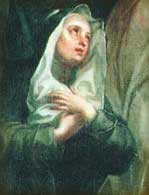 Then, the post-bridgettines' monastery was commissioned in 1917 to Ursuline Sisters who were brought over from Lvov. The Ursulines, who devoted themselves to pedagogical and educational work, took over these functions after the Visitation Sisters. They built the 2nd floor on a historic one-storey building, the side wing of the church and other outbuildings that exist to this day. They also ran the boarding school and the school until the autumn of the year 1939, thus contributing in this way to the ethical and patriotic upbringing of many generations of girls. With the permission of the occupying authorities, in 1941 they opened the Household School and in 1942 the Hotel School. In autumn 1944, they started Primary School, Secondary School and High School.
Then, the post-bridgettines' monastery was commissioned in 1917 to Ursuline Sisters who were brought over from Lvov. The Ursulines, who devoted themselves to pedagogical and educational work, took over these functions after the Visitation Sisters. They built the 2nd floor on a historic one-storey building, the side wing of the church and other outbuildings that exist to this day. They also ran the boarding school and the school until the autumn of the year 1939, thus contributing in this way to the ethical and patriotic upbringing of many generations of girls. With the permission of the occupying authorities, in 1941 they opened the Household School and in 1942 the Hotel School. In autumn 1944, they started Primary School, Secondary School and High School.
However, five years later, they were banned from enrolling pupils to the Primary School, and in 1955 the Secondary School and the High School were decommissioned by the communist authorities governed in Polish Republic. The monastic areas seized in this way were dedicated to the newly created High School nr 7, and partly to other urban institutions, among others the Literary Museum of Joseph Czechowicz - a poet from Lublin. Only part of rooms were left for the Ursulines who have taken up religious education in the parishes of Lublin, administrative and scientific work at the Catholic University of Lublin, and several of them - the service of the church.
Wartime and occupation
During the World War II, the occupation and communist times, the church of the Assumption of the Blessed Virgin Mary the Victorious, as well as many other churches, performed not only its religious and cult functions but it was also a living centre of Polish national identity, the preservation of national traditions, the maintenance of native language and customs. It was a place of mass gatherings and public expressing not only feelings and religious experiences but also patriotic thoughts and slogans. Crowds of believers were gathering in church services, prayers or celebrations in the well-known national holidays such as 3rd May or 11th November, although the participation in them was connected with a threat of being arrested, questioned or harassed.






